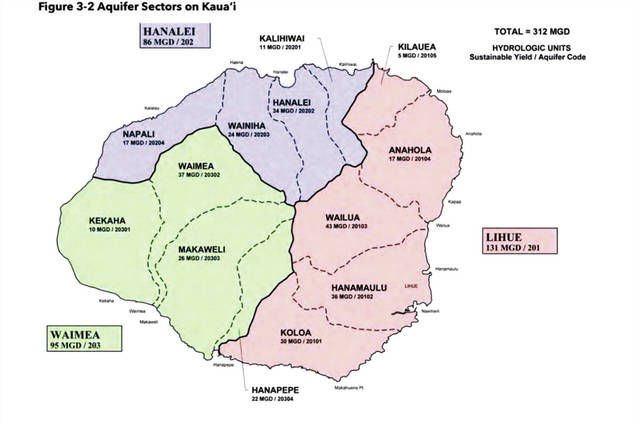LIHUE — Kauai County is creating a roadmap for the next decade of growth on the garden island, and it’s drawn a lawsuit claiming the plan doesn’t protect public trust resources. That’s because the general plan, approved by the Kauai
LIHUE — Kauai County is creating a roadmap for the next decade of growth on the garden island, and it’s drawn a lawsuit claiming the plan doesn’t protect public trust resources.
That’s because the general plan, approved by the Kauai Planning Commission on June 13, proposes an additional 6.48 million gallons of water per day be sent to Lihue to support future development.
The lawsuit claims that will have negative effects on surrounding watersheds.
Currently, groundwater well production is sufficient everywhere on Kauai except in Lihue, according to the draft general plan.
That water consumption is supplemented by an agreement with Grove Farm, using their privately owned system.
“I’m just asking the court to recognize that they’ve (Kauai Planning Commission) failed to fulfill their public trust duties, and to repeal the approval of the general plan until they fulfill their job,” said Adam Asquith, who is bringing the charges.
He said the alleged neglect of protecting the public trust water on Kauai is systemic, chronic, and ongoing.
“For those of us who still walk up these streams in and around Lihue, we see they are entirely dry,” Asquith said. “There’s no fish. There’s no water to enjoy. They’re literally dry.”
State and county agencies have to follow public trust doctrine, according to county attorney Mauna Kea Trask. But the general plan isn’t a regulatory document, he said, it’s a policy setting document.
“This plan does not allocate any water,” Trask said. “It does not act on any entitlements. It’s a policy document and it’s not regulatory under the law.”
The Kauai General Plan is a policy document that is theoretically updated every 10 years and directs responsible growth, according to the county. The last update of the general plan was in 2000.
An overarching theme and goal of sustainable growth points to an intrinsic protection of the public trust, according to Trask.
“The goal is a sustainable island,” he said. “Conservation and restoration of land and water resources provide the foundation of the policies.”
Trask continued: “The general plan is peppered with public trust doctrine. It seeks to protect it and that’s the primary overarching goal of this plan.”
But the details of water distribution in the general plan don’t reflect public trust protection, according to Asquith and others who are joining his cause.
“The plaintiff’s complaint raises concerns about how the proposed future development in the general plan will impact public trust resources,” said Anne Fredrick, of Anahola, who is also part of the Hawaii Alliance for Progressive Action.
Fredrick’s concerns also center around the north fork of the Wailua River, where current diversions take 100 percent of the base stream flow.
“This wholesale diversion of base flow leaves the streams virtually dry below the diversions under the current conditions,” Fredrick said.
Don Heacock, who lives in Kipu, suggested a step back from diverting stream flow and returning to the traditional ahupuaa watershed management system instead.
“Right now our basic problem is that the current planning system allows land use planning to precede water use planning,” Heacock said.
He continued: “We’re now using the California model, where we divert water from one watershed and bring it over to another watershed. That model doesn’t work.”
The county isn’t a stranger to public trust lawsuits. In 2014, the Planning Commission was sued for denying permits for the water bottling company Kauai Springs.
“They were trying to bottle a little water out of the stream and they needed a zoning change,” Asquith said. “The Planning Commission said no, not until you can demonstrate no impact on the public trust and Native Hawaiian rights of that water.”
The Hawaii Supreme Court ruled in favor of the Planning Commission in February 2014 and gave six principles to evaluate when considering water use requests.
Those principles are to ensure the purity and sustainable flow of water and that water is put to reasonable and beneficial use.
The principles also ensure Native Hawaiian traditional and customary rights, and mandates the request should be evaluated with other public and private uses in mind.
“Kauai Springs … basically the County of Kauai knows the public trust and protects the public trust. It got sued protecting the public trust,” Trask said.
But, Asquith says the Planning Commission ignored the Supreme Court’s evaluation principles when they approved the general plan being created under the Kauai Planning Department.
“I’m not addressing issues about allocating water, we haven’t even gotten to that yet,” Asquith said.
He continued: “What I’m saying is the Planning Commission has been instructed to make sure any applicant that wants to use water demonstrates they’ve protected the public trust.”


